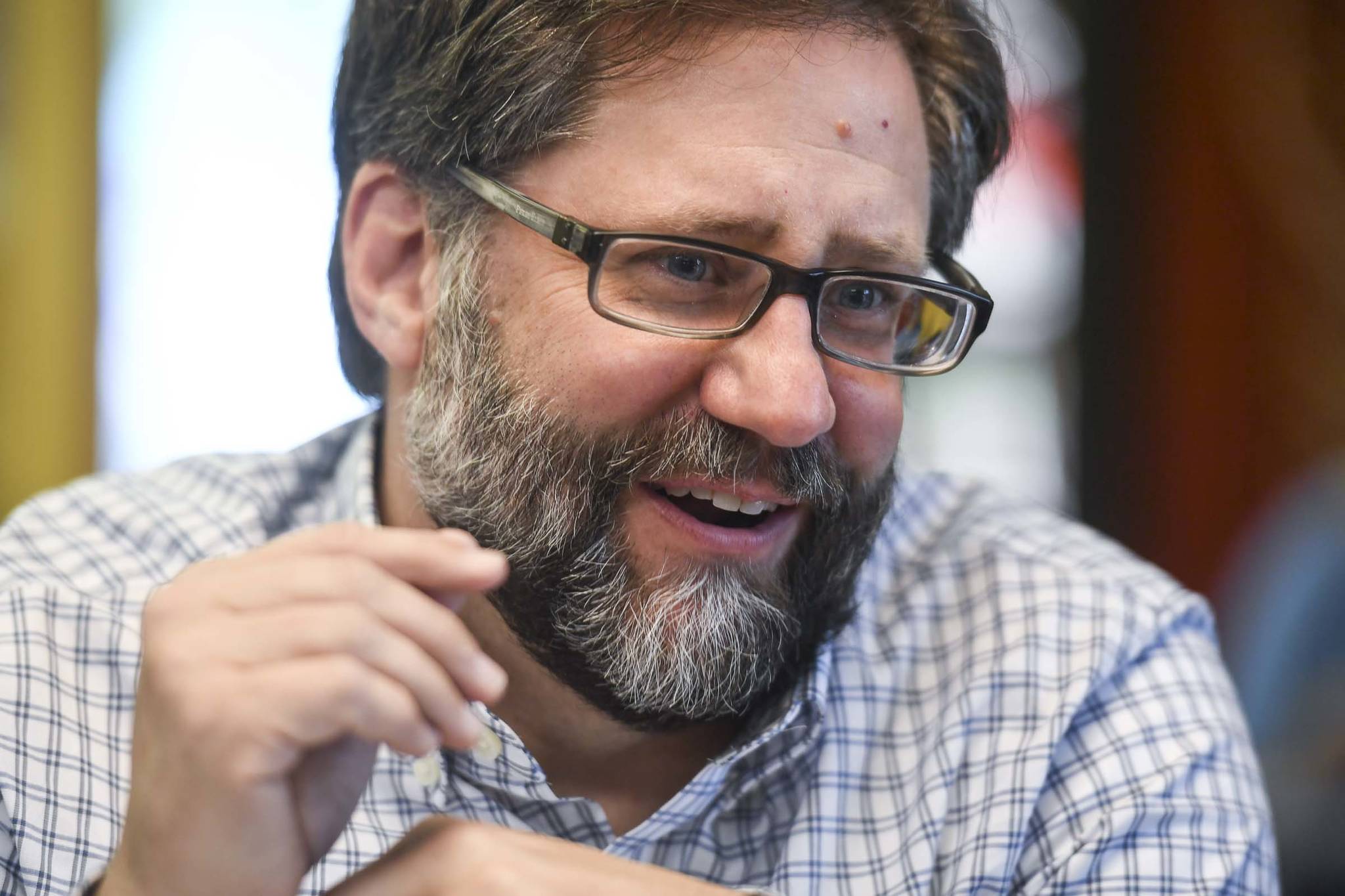Growing up in the Southeastern United States partly explains why National Endowment for the Humanities Chairman Jon Parrish Peede is in Southeast Alaska.
Peede said one of his primary goals as the head of the federal agency dedicated to supporting the humanities is to demystify the federal process and remind people the NEH’s money works for them.
“I’m from Mississippi,” Peede said in an interview during his time in Juneau. “I’m from a rural state. I graduated from a high school class of 29 people. I know what it’s like to have excellence in your community, in your state and how hard it can be to get that word out sometimes. I think a mark of my chairmanship in particular is I go to rural communities, overlooked communities — sometimes that can be the inner city — to make sure that they know it’s their endowment.”
Started the day with an interview with @juneauempire reporter @benhohenstatt. We talked about NEH grants in Juneau and all over Alaska. pic.twitter.com/d0DbX6Qov6— Chairman Peede (@NEHchair) August 23, 2019
Peede, who began serving as acting NEH chair in late 2017 before being sworn in as chair in 2018, said he hopes that by the end of the year he will have visited 40 states in a two-year period.
Those stops are about more than just being an ambassador for the federal agencies, Peede said. His week started with a stop in Anchorage, but he said visits to smaller Alaska communities such as Hoonah — population 788, according to the U.S. Census — and Kotzebue — population 3,266, according to the U.S Census — give him an idea of what humanities-related organizations are doing in those communities.
“As chairman, I have the statutory authority to make a grant to any nonprofit, and I’ve done that for Native American organizations in multiple part of the country,” Peede said. “I did that because I was there and saw the quality of the work. A lot of this isn’t representing the agency across the nation, it’s not just saying that you can get grants, it’s making direct decisions based on the people I meet.”
Peede’s stops also align with NEH grant awardees. The Robert Aqqaluk Newlin Sr. Memorial Trust in Kotzebue received a $45,087 grant to preserve and create access to 700 tapes of Inupiaq elders.
Peede took a catamaran to Hoonah Friday to be present for a totem pole dedication and is returning to Juneau to meet with representatives from museums, Alaska University Southeast and arts and culture organizations in the coming days.
Both Sealaska Heritage Institute and Juneau Arts & Humanities Council in Juneau have been awarded NEH grants over the years, too.
Since the NEH started in 1965, it’s awarded $39.4 million to Alaska. More than 33 percent of that — $13.3 million — was awarded within the past 10 years. The majority of that — $7.8 million — was awarded to the Alaska Humanities Forum, which provides support for local projects such as the audio component of Juneau’s new wayfinding project.
[More than just a Gold Rush town: Wayfinding project wants to tell about all of Juneau]
The rest of the 10-year total — $5.5 million — was awarded across 38 grants.
Those grants include the proposed New Juneau Arts & Culture Center, which received an infrastructure project grant for $750,000 shortly after Peede brought back the practice of awarding such grants.
The New JACC grant requires a 4:1 match, which means the project needs to raise $3 million to receive the funds.
“What I really like about that is it underscores the federal system,” Peede said. “Our investment is to be catalytic. We want community buy-in and one way to express community buy-in is through fundraising, volunteerism, board service and and audience attendance.”
Peede said that support will continue to come through regardless of what level of funding the state provides for the Alaska Humanities Forum. Unlike the Alaska Council on the Arts, federal support for humanities forums does not require matching state funds. However, he said the state forum is still an important organization to support.
“There’s been no reduction in funding in the Alaska Humanities Forum,” he said. “Both of those organizations together, the forum and the arts council, I think play a vital role in reaching all the small communities. We can’t replace that through the federal efforts. We don’t have those community relationships.”
[Future of the New JACC will be in voters’ hands]
Visiting far-flung portions of the country also helps with one of the NEH’s larger ongoing projects — recognizing the 250th anniversary of the founding of the United States.
Peede said telling the full story of the U.S. in 2026 will means going beyond the Declaration of Independence, the Revolutionary War and the 13 Colonies and painting a more comprehensive picture. That means gaining in-person context for how Alaska fits into some U.S. history milestones, such as how Alaskan mining activity and World War II intersected or battles in the Aleutian Islands.
“I hope the 250th anniversary will be a chance to tell thousands of small stories,” Peede said.
• Contact reporter Ben Hohenstatt at (907)523-2243 or bhohenstatt@juneauempire.com. Follow him on Twitter at @BenHohenstatt.:

